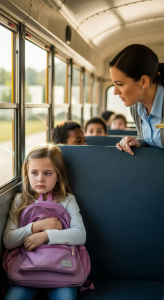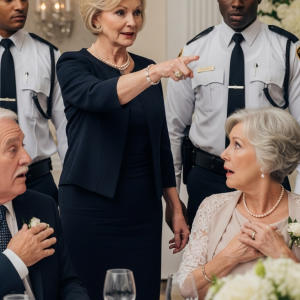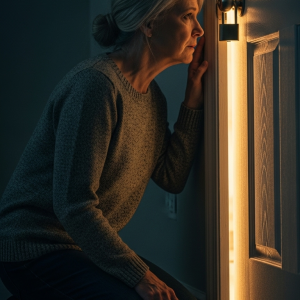For most children, the school bus is a world of its own—a rumbling yellow vessel filled with the symphony of childhood. It’s a place of excited chatter, shared secrets whispered behind high-backed seats, and the rhythmic thump of backpacks bouncing in the aisles. It is, for the most part, simply a ride.
But for five-year-old Lily, on a day that began with sunshine and a brand-new pink bow in her hair, the school bus became something else entirely. It became the stage for her first, painful lesson in human cruelty, a lesson that would momentarily shatter her innocent and trusting view of the world.
The attack was verbal, but its impact was as sharp as any stone. A group of older children, bored and thoughtless, had singled her out. The words, nonsensical yet venomous, were repeated like a cruel chant: “stupid,” “ugly,” “crybaby.” To an adult, they might be dismissed as childish taunts. But to a five-year-old, just beginning to build her sense of self, each word was a hammer blow, cracking the very foundation of her confidence.
Tears welled in her big, hazel eyes and streamed down her cheeks, a silent plea for help. And that’s when the situation spiraled from painful to truly damaging. An adult on the bus, a monitor tasked with ensuring safety, intervened. But instead of offering comfort or stopping the bullies, she chose the path of expediency. Annoyed by the commotion, she directed her frustration not at the aggressors, but at the victim. “You! Stop that crying right now,” she snapped at Lily. “If I have to deal with this nonsense, I’m calling the police, and they’ll come and take you away!”
The damage was instant and profound. The bullies faded into the background, their words replaced by a far more terrifying threat. By the time her mother, Sarah, arrived at the school for pickup, the little girl who had left home that morning with a bright smile was gone. In her place was a child hollowed out by more than just hurt. She was terrified.
The drive home was eerily silent. Then, up ahead, they saw a Prentiss County patrol car parked on the shoulder of the road. Instead of pointing it out with the usual childhood excitement, Lily let out a small, terrified gasp. She immediately ducked down below the window, covering her head with her tiny hands, and began to sob uncontrollably. At just five years old, she had been taught to believe that the very people sworn to protect her were a source of profound fear.
Sarah’s heart didn’t just break; it felt like it shattered into a million pieces. That night, after finally coaxing the fragmented, tearful story from her daughter, she felt a wave of helplessness wash over her. She took to a local community Facebook page, her fingers trembling as she typed. She didn’t ask for anger or retribution. She simply asked for prayers.
But what came next was more than prayer. It was action, swift and compassionate.
That morning had started like any other. The sun cast a warm, golden glow across the kitchen, and the smell of toasted waffles filled the air. Five-year-old Lily sat at the table, her little legs kicking excitedly beneath her chair, a smudge of syrup on her cheek. She had laid out her own clothes: a bright blue dress with smiling clouds on it, mismatched socks (one pink, one purple), and her favorite sparkly sneakers that lit up with every step.
“Are you ready for a big day at school, my little star?” Sarah asked, placing a glass of milk beside her plate.
Lily nodded enthusiastically, her pigtails bouncing. “Mrs. Davison is going to read us the book about the grumpy badger! And it’s my turn to be the line leader!”
Sarah’s heart swelled with a familiar mix of love and pride. Sending Lily off to kindergarten had been a huge step, but her daughter had embraced it with a fearless joy that was infectious. The school bus, a source of anxiety for many parents, had become a symbol of Lily’s growing independence. Sarah would watch from the porch every morning as the big yellow vehicle rumbled to a stop, its red lights flashing. Lily, clutching her unicorn backpack, would march up the tall steps with a determined confidence that made Sarah both laugh and tear up.
But that afternoon, the confidence was gone. When Sarah pulled into the school pickup line, she saw Lily standing near the teacher, but it wasn’t her Lily. Her daughter was a small, hunched figure, her usual bright energy extinguished. Her face was pale and streaked with dried tears, her eyes fixed on the ground.
“Lily-bug! How was your day?” Sarah asked, forcing a cheerful tone as she opened the car door. Lily didn’t answer. She climbed into her car seat in silence, fumbling with the buckle, her movements listless.

Sarah’s maternal instincts went on high alert. “Did something happen, sweetheart? Did you get into a disagreement with a friend?”
A tiny shake of the head was the only reply. The silence in the car was heavy, broken only by the hum of the engine. Sarah glanced in the rearview mirror, her heart aching at the sight of her daughter’s desolate expression. This was more than a bad day.
Then they saw the patrol car. It was a routine traffic stop, an officer speaking calmly with another driver. But for Lily, it was a monster appearing on the horizon. Her breath hitched, and a strangled sob escaped her lips. She dove down in her seat, curling into a tight ball, her hands clamped over her ears as if to block out a terrible sound.
“Lily! Honey, what is it? It’s just a policeman,” Sarah said, her voice laced with confusion and a rising sense of panic.
“He’s going to take me!” Lily wailed from the floor of the car. “The lady said! She said they take you away if you cry!”
The pieces of the puzzle slammed together in Sarah’s mind, forming a picture of unimaginable pain. Later that evening, after a long bath and a story, the full narrative emerged between hiccups and sobs. Lily recounted the names she was called, the shame she felt, and the terrifying threat from the bus monitor. The bullies had hurt her feelings, but the adult had broken her trust in the world.
Sarah felt a white-hot rage mix with a profound sadness. Her daughter, who had once waved enthusiastically at every police car, was now hiding from them. A symbol of safety had been twisted into a symbol of fear. Feeling utterly lost, she opened her laptop. Her post was simple and raw: “My 5-year-old daughter was bullied on the bus today, and an adult, instead of helping, threatened her with the police. Now she’s terrified of them. My heart is broken. Please, just pray for her.”
She hit “post,” closed the laptop, and went to hold her sleeping daughter, feeling as though she had failed to protect her from a wound she couldn’t see
That very night, not three hours after Sarah’s desperate plea went out into the digital world, there was a knock on their front door. It was gentle, not demanding, but it still sent a jolt of anxiety through Sarah. It was late. They weren’t expecting anyone.
She peered through the peephole, and her heart skipped a beat. Standing on her porch were two police officers from the Booneville Police Department. For a terrifying second, the bus monitor’s threat echoed in her own mind. She took a deep breath, opened the door a crack, and saw Lily, who had been woken by the sound, peeking out from behind her legs, her eyes wide with fear.
The officers were not what she expected. They weren’t standing in imposing stances. They were smiling, their expressions open and kind. One of them, Officer Jonathan Luttrell, immediately knelt down, bringing himself to eye-level with the terrified child hiding behind her mother.
“Hey there,” he said softly, his voice a gentle rumble. “My name is Jonathan, and this is my friend, Blake. We heard you had a really tough day, and we wanted to come and make sure you were okay.” He wasn’t wearing the imposing uniform hat, and his focus was entirely on Lily.
Officer Blake Burress held up two small bags. “We also heard that you might like presents,” he said with a warm grin. “I have a daughter about your age, and she says presents can fix almost anything.”
Sarah, stunned into silence, slowly opened the door wider. The officers stepped inside, moving with a quiet calm that seemed to deliberately drain the tension from the room. They didn’t come in as authority figures; they came in as friends. They sat on the floor of the living room, cross-legged, and opened the bags. Inside were coloring books, stickers, and a small, plush toy.
They didn’t ask Lily about the bus or the bullies. They asked her about her favorite color (pink and purple), her favorite animal (unicorns), and what she wanted to be when she grew up (a veterinarian who was also a princess). They let her touch the shiny badges on their shirts, explaining that they were symbols that meant they were helpers.
“You know, our job is to protect people,” Officer Luttrell explained, his voice still soft. “Especially kids. If anyone is ever mean to you or makes you feel scared, we’re the people you can call. We’re on your team. We’re the good guys.”
Slowly, miraculously, Sarah watched the fear in her daughter’s eyes begin to recede, replaced by a cautious curiosity, and then by a genuine sparkle. Lily, who had been hiding just twenty minutes earlier, was now laughing, showing the officers her favorite drawings taped to the refrigerator.
By the time they left, Lily gave both of them a fierce hug. That night, as Sarah tucked her into bed, Lily whispered, “Mommy, Jonathan and Blake are my best friends now.” The wound was not gone, but a powerful healing balm had been applied
The next morning, however, the fear returned. The memory of the bus ride was a dark shadow that the previous night’s kindness hadn’t entirely banished. As Sarah helped Lily get dressed, she could see the anxiety in her daughter’s movements. The bright, confident little girl was still hesitant, her smile fragile.
“I don’t want to go on the bus, Mommy,” Lily whispered, her lower lip trembling. “What if they’re mean again?”
Sarah’s heart sank. She was preparing to drive Lily to school herself when she saw two vehicles pull up outside their house. They weren’t Booneville police cars. They were the brown and gold SUVs of the Prentiss County Sheriff’s Department. Two deputies got out, their hats held respectfully in their hands.
Officer Luttrell, it turned out, had made a call.
One of the deputies, Taylor Walker, approached the front door with the same gentle warmth as the officers from the night before. He knelt down as soon as he saw Lily. “Hi Lily, my name is Taylor,” he said, his smile genuine. “Your friends Jonathan and Blake told me you might need a special escort to school today. And I brought you a present.”
He held out a small, incredibly soft stuffed puppy. Lily’s eyes widened. She took the toy, hugging it tightly to her chest.
“Sometimes, even when we’re scared, we have to be brave,” Deputy Walker continued, his voice kind. “And brave people always have partners. How about I be your partner today? We can walk into school together.”
He held out his hand. Hesitantly, Lily slipped her small hand into his large, steady one. Her other hand clutched the new puppy. Together, with Deputy Tyler Reese walking alongside them, they walked Lily not just to the school bus, but all the way to the front door of her school building.
Sarah watched from her doorway, tears streaming down her face. This time, they were tears of overwhelming gratitude. She saw her daughter, who had been consumed by fear just moments before, walking tall and proud, holding the hand of a man in uniform. She watched the transformation happen in real-time—from tears to the biggest, brightest smile she had ever seen.
What those officers from two different departments gave Lily was so much more than presents or a special escort. They gave her back her sense of security. They painstakingly rebuilt the bridge of trust that had been carelessly burned down by the cruel words of a few children and one thoughtless adult.
They proved, with their time, their patience, and their profound kindness, that law enforcement isn’t a boogeyman to be used as a threat. It is a community of human beings who care, who serve, and who are willing to step in when others fail to protect the most vulnerable among us.
Too often, the narrative surrounding police officers is one of conflict, criticism, or fear. They are misrepresented in media or, as in this case, used as a tool to scare children into obedience. But this story shines a different, more truthful light. It reveals the deep well of humanity that lies beneath the badge, the innate desire to protect and serve that motivates good officers to go far beyond the call of duty.
It takes a special kind of heart to comfort a child who has been taught, however briefly, to fear you.
The little girl who once hid her face at the sight of a patrol car now knows the truth. She knows that officers are not to be dreaded, but to be trusted. They are her friends, her protectors, her helpers.
Sarah will never forget what those men did for her daughter. As she later wrote, updating her original post, “The world needs to see this. They need to know how much law enforcement really cares. These officers, Jonathan Luttrell, Blake Burress, Taylor Walker, and Tyler Reese, deserve to be recognized. They made a huge, positive impact on my little girl’s life.”
For one five-year-old girl in Mississippi, they didn’t just change a bad day into a good one. They fundamentally changed her story—transforming a narrative of fear and hurt into one of trust, kindness, and the unwavering belief that heroes are real, and sometimes, they wear uniforms.




